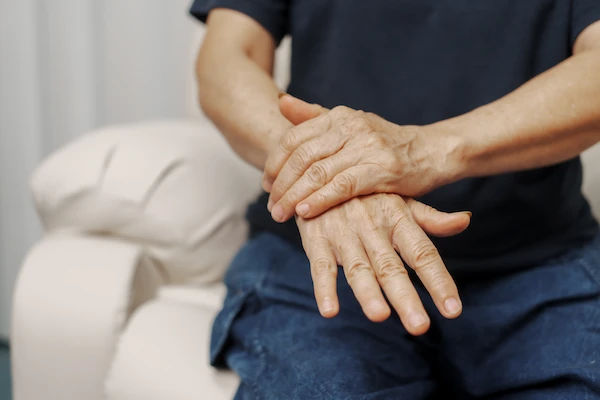Symptoms of Parkinson's Disease Explained
Discover the early signs and common symptoms of Parkinson’s disease, including tremors, stiffness, and mood changes. Discover how it's diagnosed and effectively managed.


Parkinson’s disease is a progressive neurological disorder that affects movement and can cause a range of symptoms. While it is more common in older adults, it can affect people at any age. Recognising the symptoms early can help in managing the condition better.
In this article, we’ll discuss the common symptoms of Parkinson’s disease, how they develop, and what you can do to manage them.
What Are the Early Signs of Parkinson’s Disease?
Parkinson’s symptoms usually start gradually and worsen over time. Some early warning signs include:
1. Tremors (Shaking)
- One of the most noticeable symptoms is a slight shaking or tremor, usually starting in the hands or fingers (often called a "pill-rolling" tremor).
- It may occur at rest and lessen when moving.
2. Slowed Movement (Bradykinesia)
- Simple tasks like walking, buttoning a shirt, or getting up from a chair may become slower.
- Steps may become shorter, and dragging feet while walking is common.
3. Muscle Stiffness
- Stiffness in any part of the body can make movement painful and limit flexibility.
- Some people experience a "frozen" feeling, making it hard to start moving.
4. Balance and Posture Problems
- Difficulty maintaining balance, leading to a stooped posture.
- Increased risk of falls due to instability.
5. Changes in Speech and Writing
- Speech may become softer, slurred, or monotone.
- Handwriting may appear smaller and cramped (micrographia).
Other Common Symptoms of Parkinson’s Disease
Apart from movement-related symptoms, Parkinson’s can also cause:
1. Sleep Problems
- Insomnia, restless sleep, or sudden movements during sleep.
- Acting out dreams (REM sleep behaviour disorder).
2. Loss of Smell (Anosmia)
- Reduced ability to smell certain foods or odours.
3. Mood Changes
- Depression, anxiety, or irritability may develop before motor symptoms appear.
4. Constipation and Digestive Issues
- Slowed digestion can lead to frequent constipation.
5. Fatigue
- Feeling extremely tired, even after rest.
Consult Top Specialists
What Causes Parkinson’s Disease?
The exact cause is still unknown, but experts believe it’s due to a combination of:
- Loss of dopamine-producing brain cells (dopamine helps control movement).
- Genetic factors (though most cases are not directly inherited).
- Environmental triggers (exposure to toxins like pesticides may play a role).
How Is Parkinson’s Disease Diagnosed?
There is no single test for Parkinson’s. Doctors diagnose it based on:
- Medical history and symptoms.
- Neurological and physical exams.
- Sometimes, imaging tests like MRI or DaTscan to rule out other conditions.
If you or a loved one notices these symptoms, consult a neurologist for an accurate diagnosis.
Tips for Managing Parkinson’s Symptoms
While there is no cure, treatments can help manage symptoms effectively:
1. Medications
- Levodopa, dopamine agonists, and other drugs help control tremors and stiffness.
2. Physical Therapy & Exercise
- Regular movement (walking, yoga, tai chi) improves flexibility and balance.
- Strength training helps maintain muscle function.
3. Healthy Diet
- High-fibre foods to manage constipation.
- Protein management (some proteins can interfere with medications).
4. Emotional Support
- Counselling or support groups can help cope with emotional changes.
5. Fall Prevention
- Use walking aids if needed.
- Keep living spaces clutter-free to avoid tripping.
When to See a Doctor?
If you or someone you know experiences:
- Persistent tremors or stiffness.
- Unexplained balance problems.
- Changes in speech or handwriting.
It’s best to seek medical advice as soon as possible. Early treatment can significantly improve quality of life.
Need Help? Consult a Specialist on Apollo 24|7
If you suspect Parkinson’s symptoms, don’t wait. Early diagnosis and treatment can make a big difference.
Book a consultation with a neurologist on Apollo 24|7 for expert advice and care.
Remember: While Parkinson’s is a lifelong condition, proper management can help you stay active and independent for years.
Conclusion:
Recognising the symptoms of Parkinson’s disease early can lead to better treatment outcomes and improved quality of life. With proper medical care, lifestyle adjustments, and support, many people with Parkinson’s can continue to live fulfilling, independent lives.Consult Top Specialists
Consult Top Specialists

Dr. Mainak Baksi
General Practitioner
13 Years • MBBS , MD (MPH)
Howrah
Mainak Baksi Clinic, Howrah
(50+ Patients)
Dr. Gaddam Manoj
General Practitioner
1 Years • MBBS
Hyderabad
Aaradhya clinic, Hyderabad
Dr. Sahana B
General Practitioner
3 Years • MBBS
Koppal
Khushi multi-speciality hospital, Koppal
Dr Nikhat Shamim
General Practitioner
4 Years • MBBS
Kolkata
VIP MEDICAL SERVICE, Kolkata

Dr Suseela
General Physician
5 Years • MBBS
Bengaluru
Apollo Medical Center, Marathahalli, Bengaluru
Consult Top Specialists

Dr. Mainak Baksi
General Practitioner
13 Years • MBBS , MD (MPH)
Howrah
Mainak Baksi Clinic, Howrah
(50+ Patients)
Dr. Gaddam Manoj
General Practitioner
1 Years • MBBS
Hyderabad
Aaradhya clinic, Hyderabad
Dr. Sahana B
General Practitioner
3 Years • MBBS
Koppal
Khushi multi-speciality hospital, Koppal
Dr Nikhat Shamim
General Practitioner
4 Years • MBBS
Kolkata
VIP MEDICAL SERVICE, Kolkata

Dr Suseela
General Physician
5 Years • MBBS
Bengaluru
Apollo Medical Center, Marathahalli, Bengaluru


